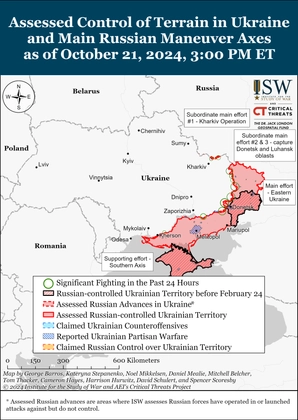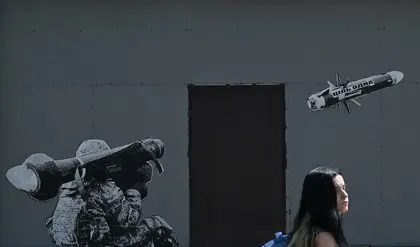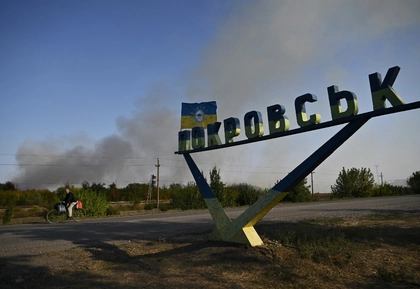The enemy’s military operations have slowed as the Ukrainian Armed Forces (UAF) conduct “creeping counterattacks” in the Kherson region. Meanwhile, the killing of captured Azov prisoners by the Russian forces has escalated tensions, serious changes have taken place on the political scene, and internal political conflicts in Ukraine are gaining international attention.
The military situation
JOIN US ON TELEGRAM
Follow our coverage of the war on the @Kyivpost_official.
Behind the scenes of a lull in fighting, both sides are struggling for a major strategic gain that will shape the next stage of the war.
The enemy continues to attack Ukrainian troops in the Donetsk region whilst preparing for further assaults on the district of Sloviansk. The occupiers are also strengthening positions on the right bank of the Dnipro in the Kherson region, having amassed as many as 25,000 military personnel.
For their part, the UAF are concentrating their power in the south of the country. They have successfully destroyed the Antonivskyi road and rail bridges over the Dnipro river, isolating Russian forces from other occupied areas and regaining ground.
As a result, the enemy has been left with a limited supply of ammunition, fuel and the ability to replenish military equipment. Most Russian supply warehouses in the area have been (or will be) destroyed by HIMARS.
Attempts by the occupiers to establish pontoon crossings across the Dnipro have so far proved fruitless. Delivery of the necessary weapons and ammunition to the Russians by airplanes is unlikely to be effective. Ukraine’s troops have a strong supply of air defense equipment on the battlefield and the occupiers have a limited number of transport planes.

ISW Russian Offensive Campaign Assessment, October, 22, 2024
Sooner or later, the Russians will experience “shell hunger” and a lack of other supplies. They will be faced with a choice: passively suffer under the constant fire of the Ukrainian army, or go on a fruitless attack. Alternatively, they could try to evacuate to the left bank of the Dnipro, abandoning heavy equipment, or simply surrender. The latter would clearly be the preferred option.
By the end of the summer, the main focus of military operations is expected to be in the Kherson region, where the Ukrainian army is already creating a strong advantage.
The success of Ukraine’s forces in Kherson will pose a threat to the entire enemy group in the neighboring Zaporizhzhia region to the east and near Mariupol in the south-east.
Assassination of captured “Azov” soldiers
The murder of children, destruction of cities, constant rocket attacks and what looks like genocide in and around Bucha – Russian war crimes are becoming too numerous to count and last week were supplemented by another violation.
On July 29, members of the “Wagner” group are believed to have killed around 50 captured men from Ukraine’s “Azov” regiment, with a further 70 Ukrainian soldiers wounded. According to insider information, the direct order to liquidate the Ukrainian military was given by the boss of the company, Yevgeny Prigozhin, one of Russian dictator Vladimir Putin’s butchers.
Having organized explosions in the barracks where they kept the prisoners, the enemy blamed this on the UAF, purporting that they destroyed their own captured people with HIMARS.
Let us not analyze in detail the absurdity of “rashist” lies. Instead, let us focus instead on the consequences of this crime.
Firstly, there is the risk of escalation. Ukraine is a party to international conventions on prisoners of war. But it will be difficult for our defenders to explain why they should safeguard the lives of captured occupiers after the mass murder of the “Azov” soldiers. It is impossible to ignore the dead mutilated bodies and screams of pain from one of the Ukrainian prisoners who was castrated and then killed by the Russians.
Andrii Biletskyi, the first commander of “Azov” announced the hunt for all participants in this heinous crime. The Commander-in-Chief of the UAF, Valerii Zaluzhnyi, is convinced that all guilty parties will be punished.
The only argument that can deter our defenders is that the more Russian prisoners we have, the more we can exchange them for our soldiers.
The war is becoming more brutal and it seems that there are no red lines that the rashists will not cross. Punishment for those crimes must be inescapable.
Changes on the political scene
Domestic political processes in Ukraine almost ground to a halt when Russia launched its full-scale invasion. A form of non-aggression pact was put in place, although this has been violated from time to time by the authorities and opposition parties.
Most of these activities took place behind the scenes of the political stage. However, in mid-July there was a public “explosion” – the head of the State Security Service of Ukraine (SBU) Ihor Bakanov, and Prosecutor General Iryna Venediktova, were dismissed.
Despite their being close to President Zelensky, the claims against them were serious: that they did not fight hard enough against Russian aggression by root outing enemies within their units. These claims are important because during the time of independence, hundreds of Russian spies infiltrated the SBU, especially when it was headed by a Russian citizen, Oleksandr Yakymenko.
It is worth noting that there were no prior direct complaints made against these high-ranking officials. Instead, the matter lies more in the banal struggle for power. After an informational attack against the Head of the Presidential Administration Andrii Yermak, there appears to have been retaliation and the two prominent officials were removed from their positions.
Andrii Kostin, who is close to Yermak, was appointed to the position of Prosecutor General. In this way, Yermak is seen to strengthen his influence not only personally on the country’s leader, but on the entire hierarchy of power.
It seems that Venediktova’s problems have gone away at least for now, with no official investigation having been scheduled and some political powers wanting to appoint the former Prosecutor General as ambassador of Ukraine to Switzerland. Meanwhile, Ihor Bakanov has disappeared from public view.
In a time of war, it is more important than ever that key officials remain above suspicion. The president must understand that responsibility for Yermak’s actions must be borne personally by the head of state. Where there is even the slightest doubt, Zelensky must act and dismiss.
The firing of Ruslan Demchenko, who was accused of working for Russian intelligence, remains a separate story. The deputy secretary of the National Security Council and the chairman of the Intelligence Committee seemingly became too “toxic” and began to negatively affect the image of the president, and hence was sacrificed.
Such perturbations, motivated at least in part by personal interest, do not help Ukraine’s current situation in a time of war. Government efficiency has already slowed and any political rumblings will undoubtedly be scrutinized by our Western partners who are watching closely.
The only positive point in this story is the appointment of Oleksandr Klymenko as head of the Specialized Anti-Corruption Prosecutor’s Office. Thus, one of Ukraine’s homework tasks for becoming closer to the goal of being a European Union member has been completed.
Ihor Zhdanov is a co-founder of the Open Policy Foundation, a National Government Organization (NGO) in Ukraine.
The views expressed in this article are the author’s and not necessarily those of the Kyiv Post.
You can also highlight the text and press Ctrl + Enter






